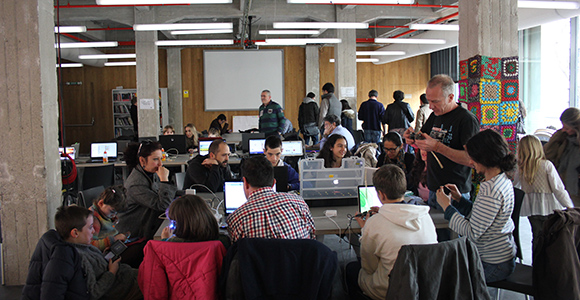
(Photo Credit: Medialab Prado/Flickr)
An estimated 850,000 of California’s “stranded workers”—those who are working but whose job skills are not allowing them to advance—are 34 years or under and live in Los Angeles County.
There have been 15 Future of Work MeetUps held in the last couple of months to discuss efforts underway to address this workforce-in-need across California where more 2.5 million of them in that age range live and work.
It’s a problem not only for workers but for employers who are increasingly having difficulty finding qualified and trained workers, much less hire. The California Economic Summit launched in 2016 the One Million Worker Challenge in response to the problem—with the goal of increasing the pool of middle skills workers by that number over the next decade.
The depth of the problem may explain why there was an excellent turnout of business interests last week at the latest MeetUp in L.A., which was held at the Los Angeles Area Chamber of Commerce. Leaders from the health care, technology, global trade and logistics and small business sectors all attended.
 “There’s a need for future ready skills,” said Van Ton-Quinlivan, executive vice chancellor of the California Community Colleges who has led the statewide workforce conversation about stranded workers.
“There’s a need for future ready skills,” said Van Ton-Quinlivan, executive vice chancellor of the California Community Colleges who has led the statewide workforce conversation about stranded workers.
The vice chancellor was also promoting Governor Brown’s proposal to create a statewide online community college, which could create a new opportunity for stranded workforce to advance their jobs skills through a competency-based and self-paced program.
In other words, though many in this group often have work and family obligations that prevent easy access to existing brick-and-mortar colleges, they could still learn and advance at their own pace with the proposed online-only college classes.
The vice chancellor has attended every one of these MeetUps and has heard the concerns about the support needs of many nontraditional students. Ton-Quinlivan emphasized the online college must offer a high-support student experience that makes sure stranded workers—about half of whom are Spanish-language dominant—can enroll and participate in a way that can make them successful.
“The quality of a fully-supported online education is improving,” she said while describing the online college will have faculty subject matter experts, mentors and assessors to help ensure success.
As the workforce has changed, so have the requirements of what it takes to land and keep a middle skills job that pays a living wage.
“Talent development is a key to California’s economic competitiveness,” said Kish Rajan, former head of California's GO-Biz department who has returned to the private sector. “The change in the labor markets is dislocating lots of folks and we need to help them.”
A recent survey showed that 30 percent of Information Technology jobs in the region are held by employees who don’t have a four-year degree, a middle-income job opportunity noted by Sean Arian who runs the Bixel Exchange, a workforce and entrepreneur support partnership in Los Angeles.
In the 2018-19 budget, Governor Brown proposed spending $120 million to open the online community college by fall 2019, with a focus on short-term credential programs for careers in fields including advanced manufacturing, healthcare and child development.
A decision by legislators on the proposed state budget is expected soon.
One more public Future of Work MeetUp is scheduled—for Fresno in late May, which will most likely be after the state legislature decides on the online college proposal.
“The local Los Angeles leaders engaged in a very creative discussion on how to address the stranded worker issue,” said Leah Grassini Moehle, California Forward workforce project director who helped organize the events. “This is exactly the type of discourse that can result in better ways to address the worker shortage in California.”

